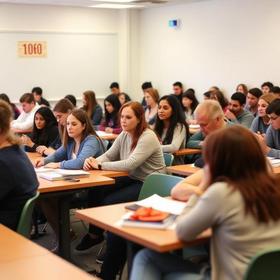- The American Academy of Dramatic Arts is a vibrant community of practicing professionals and students working together in a challenging and supportive environment.
School Highlights
American Academy of Dramatic Arts-New York serves 231 students (100% of students are full-time).
The college's student-teacher ratio of 5:1 is lower than the state community college average of 13:1.
Minority enrollment is 62% of the student body (majority Hispanic and Black), which is equal to the state average of 62%.
Quick Facts (2026)
- Enrollment: 231 students
- Private-state tuition: $30,650
- Acceptance Rate: 58%
- Student-teacher ratio: 5:1
- Minority enrollment: 62%
- Source: Integrated Postsecondary Education Data System (IPEDS)
Top Rankings
American Academy of Dramatic Arts-New York ranks among the top 20% of public schools in New York for:
Category
Attribute
School Resources
School Overview
The teacher population of 48 teachers has stayed relatively flat over five years.
American Academy of Dramatic Arts-New York
(NY) Community College Avg.
Carnegie Classification
Special Focus Two-Year: Arts & Design
Baccalaureate/Associate's Colleges: Mixed Baccalaureate/Associate's
Institution Level
At least 2 but less than 4 years
At least 2 but less than 4 years
Institution Control
Private not-for-profit
Private not-for-profit
Total Faculty
48 staff
159 staff
School Calendar
Student Body
The student population of American Academy of Dramatic Arts-New York has grown by 45% over five years.
The student-teacher ratio of 5:1 has decreased from 16:1 over five years.
The American Academy of Dramatic Arts-New York diversity score of 0.73 is less than the state average of 0.76. The school's diversity has declined by 10% over five years.
Total Enrollment
231 students
1,129 students
Student-Teacher Ratio
5:1
13:1
# Full-Time Students
231 students
528 students
# Part-Time Students
n/a
601 students
# Enrollment Undergraduate
231 students
357 students
# Full-Time Undergraduate Students
231 students
519 students
# Full-Time Graduate Students
n/a
44 students
# Part-Time Undergraduate Students
n/a
850 students
# Part-Time Graduate Students
n/a
41 students
Total Dormitory Capacity
144 students
382 students
% American Indian/Alaskan
n/a
n/a
% Asian
4%
8%
% Hispanic
9%
23%
% Black
8%
18%
% White
38%
38%
% Hawaiian
n/a
2%
% Two or more races
5%
3%
% Non Resident races
32%
3%
% Unknown races
3%
5%
Diversity Score
0.73
0.76
College Completion Rate (Students who graduate in less than 4 years)
66%
33%
College Completion Rate (Students who graduate in 4 years or more than 4 years)
n/a
40%
Average Graduate Earnings (10 Years)
$35,300
$35,200
Tuition and Acceptance Rate
The private state tuition of $30,650 is more than the state average of $16,503. The private state tuition has declined by 17% over four years.
Private State Tuition Fees
$30,650
$16,503
% Students Receiving Some Financial Aid
100%
88%
Median Debt for Graduates
$12,000
$13,841
Median Debt for Dropouts
$5,500
$5,500
Acceptance Rate
58%
74%
SAT Reading
n/a
475
SAT Math
n/a
505
SAT Writing
n/a
485
ACT Composite
n/a
20
ACT English
n/a
18
ACT Math
n/a
20
Source: 2024 (or latest year available) Integrated Postsecondary Education Data System (IPEDS)
School Notes
- The American Academy of Dramatic Arts has both the location and the program to move you closer to your dream. With campuses in the hearts of both New York City and Los Angeles, the Academy offers the aspiring actor a stimulating, inspiring environment and a fertile ground for professional and personal growth. The two campuses comprise one school, sharing the same philosophy, objectives and programs. The Academy's New York campus is right on Madison Avenue, in a landmark building designed by acclaimed architect Stanford White. The six-story structure has classrooms, rehearsal halls, dance studios, dressing rooms, a prop department and production workshop, a costume department, a library and a student lounge. Three theatres — a 169-seat proscenium theatre, a 164-seat thrust-stage theatre and an arena-style theater seating 103 — are used for classes and rehearsals as well as full productions. The Academy stresses practical, professional training for stage, film and television. The program is highly structured, focusing on acting, voice and speech, and movement, with an emphasis on self-discipline, self-discovery and, above all, individuality. At each stage of development, students' classroom knowledge is tested through onstage performances.
- Sample of notable school alumni/alumnae:
- Kirk Douglas - Award-winning actor - 1940 -
- Jessica Chastain - Two-time Academy Award nominee - 2003 -
Frequently Asked Questions
How much does American Academy of Dramatic Arts-New York cost?
American Academy of Dramatic Arts-New York's private state tuition is approximately $30,650.
What is the acceptance rate of American Academy of Dramatic Arts-New York?
The acceptance rate of American Academy of Dramatic Arts-New York is 58%, which is lower than the state average of 74%.
Who are famous alumni from American Academy of Dramatic Arts-New York?
American Academy of Dramatic Arts-New York famous alumni include: Kirk Douglas - Award-winning actor - 1940 and Jessica Chastain - Two-time Academy Award nominee - 2003.
What is American Academy of Dramatic Arts-New York's ranking?
American Academy of Dramatic Arts-New York ranks among the top 20% of community college in New York for: Percent of students receiving financial aid.
Recent Articles

Part-Time vs. Full-Time Enrollment in 2025: Which Is Better?
Explore part-time vs. full-time enrollment in 2025, comparing costs, flexibility, outcomes, and goals to help students choose the right path.

How Community Colleges Use AI Tools to Support Student Success
Explore how community colleges are using AI tools in 2025 to improve advising, learning, retention, and student success.

Nontraditional Student’s Guide to Community College 2025
Comprehensive guide for nontraditional students at community college with updated tuition, support, careers, and success strategies for 2025.







